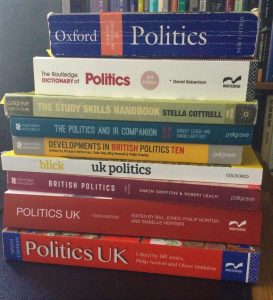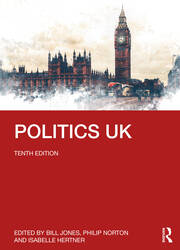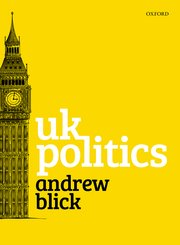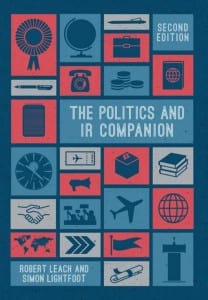 Choosing a textbook for your first-year politics course can be a daunting prospect, as much for those delivering the course as for students embarking on a degree in politics. As I write this a pile of no less than ten different politics textbooks totters on the edge of my desk, many of them in multiple editions. Most are designed as broad introductions to British government and politics and cover broadly the same ground. Alongside them sits an, albeit smaller, pile of politics dictionaries, and a diverse assortment of general introductions to recent developments. Selecting a single volume from this ever-growing pile is no easy task.
Choosing a textbook for your first-year politics course can be a daunting prospect, as much for those delivering the course as for students embarking on a degree in politics. As I write this a pile of no less than ten different politics textbooks totters on the edge of my desk, many of them in multiple editions. Most are designed as broad introductions to British government and politics and cover broadly the same ground. Alongside them sits an, albeit smaller, pile of politics dictionaries, and a diverse assortment of general introductions to recent developments. Selecting a single volume from this ever-growing pile is no easy task.
Keeping up with events
One simple and effective criteria is to select the most recently published textbook on the basis that if a week is a long time in politics then the years between editions of most standard textbooks amount to a political epoch. The pace of political change in the UK over the last few years means that most politics textbooks are out of date long before they hit the bookshops. Publishers generally attempt to keep up with the electoral cycle so that new editions of established titles appear after each general election. But with three general elections in five years, interspersed with a referendum on EU membership, the demands of keeping pace with events has posed a particular challenge to publishers and those responsible for writing textbooks.
 This year’s students have the benefit of a new edition of the of the popular Politics UK textbook by Bill Jones, Philip Norton and Isabelle Hertner, the 10th edition of which was published in the summer of 2021. Although this is a long-established franchise the latest edition has been substantially revised to reflect recent developments and is almost 100 pages longer than the previous edition. The 9th edition was substantially updated to encompass Brexit and also the impact of the Trump Presidency on the UK. The 10th edition benefits from new chapters on ‘Elites in the United Kingdom’ and ‘Gender and British Politics’ and on ‘UK immigration policy in a hostile environment’. These are very welcome additions and reflect a broader focus on British society and to some extent the inequalities which underpin it, rather than simply focusing on the political process.
This year’s students have the benefit of a new edition of the of the popular Politics UK textbook by Bill Jones, Philip Norton and Isabelle Hertner, the 10th edition of which was published in the summer of 2021. Although this is a long-established franchise the latest edition has been substantially revised to reflect recent developments and is almost 100 pages longer than the previous edition. The 9th edition was substantially updated to encompass Brexit and also the impact of the Trump Presidency on the UK. The 10th edition benefits from new chapters on ‘Elites in the United Kingdom’ and ‘Gender and British Politics’ and on ‘UK immigration policy in a hostile environment’. These are very welcome additions and reflect a broader focus on British society and to some extent the inequalities which underpin it, rather than simply focusing on the political process.
Another valuable feature of recent editions of Politics UK is the inclusion of short think pieces at the end of each section under the tagline, ‘And another thing…’ These provide valuable commentary on key issues and events. The 10th edition includes interesting pieces by Julie Smith on Parliament in light of Brexit, John Curtice on Conservative voters, and Philip Collins on the decline of civic discourse. The only problem with these short commentaries is that one can no longer simply dispose of the earlier edition when a new one is published. While students embarking on a degree in 2021 will be well served by the 10th edition of Politics UK, they would also be well-advised to seek out earlier editions in order to read the short end-pieces such as those by Simon Jenkins on the future of the UK and Bill Jones on fake news from the 9th edition, Mark Garnett on the 2011 riots, Peter Riddell on the decline of the mainstream media and Michael Moran on whether it is possible to buck the markets from the 8th edition, Andrew Gamble on the legacy of empire and Chris Mullin on the parliamentary expenses scandal from the 7th edition and Hugo Young’s excellent essay in the 6th edition.
It is also worth noting that even the most recent editions of textbooks rarely offer an entirely new perspective on events. One of the reasons that textbooks can go through many editions in a relatively short space of time is that recent developments are generally absorbed into an existing, usually successful, framework. It is the nature of textbooks that they rarely present cutting edge, original research but provide a distillation of current received wisdom on particular issues, and at their best, an introduction to key debates in the wider literature. In the case of the latest edition of Politics UK, for example, aside from three new chapters, the chapter headings and indeed the content is broadly the same as in previous editions.
Partly as a result of this, another criticism of many politics textbooks is that they often focus too much on explaining the relatively unchanging systems of government but provide less effective commentary on the more dynamic politics which takes place within them. While most will provide an introduction to the principal actors and institutions of the British political system they can, at times, read like guidebooks or manuals, which explain how the system works but not why it operates in a particular way. Rather like a Haynes car manual they often adeptly explain how the machine operates without considering the impact of whoever is driving it. This is a point well made in this review from The Times Higher in which Eric Shaw observes that some politics textbooks, including an earlier edition of Politics UK, can:
In many of these books the answer to the question ‘who runs Britain?’ often begins something like ‘Britain is a parliamentary democracy….’ which perhaps somewhat misses the point. In response to this, in previous years I have recommended Dearlove and Saunders excellent Introduction to British Politics, which covers much the same ground as many of the other textbooks but in many areas offers a more thoughtful and critical edge. Sadly, the most recent edition was published in 2000 and is unlikely to meet the needs of students starting their degree today, while the previous edition was published in 1991, and was a set text on my own undergraduate degree.
Joint or single-authored?
Another worthwhile consideration is whether textbooks are single-authored or include chapters by a range of different authors. It is the nature of academic research that most scholars tend to develop depth of knowledge over breadth. The advantage of books with multiple authors is that individual chapters are usually contributed by experts on each subject. Single-authored books in contrast reflect the expertise, but also the limitations, of a single author’s knowledge. Writing a textbook which encompasses in some depth every aspect of British government and politics is a tall order, even for the most accomplished scholar, as this article in The Time Higher observed. Nevertheless, some have managed this with some success.
 Moreover, while nobody sits down and reads a textbook in one sitting, books by a single author can sometimes display a coherence and consistency of purpose which can make them more readable than those written by multiple authors. In this regard I have in the past recommended Moran’s Politics and Governance in the UK or John Kingdom’s Government and Politics in Britain over Politics UK. A notable addition to the field in this regard is Andrew Blick’s UK Politics published by Oxford University Press this summer. Blick is a well-respected expert on the UK constitution, amongst other things. His book is particularly good on the location of power in the British political system and the intersection between Government, Parliament and the civil service. In keeping with other recent textbooks on UK politics it also includes interesting material on British society with a valuable chapter on identity, equality and power, as well as a useful chapter on communications and public opinion.
Moreover, while nobody sits down and reads a textbook in one sitting, books by a single author can sometimes display a coherence and consistency of purpose which can make them more readable than those written by multiple authors. In this regard I have in the past recommended Moran’s Politics and Governance in the UK or John Kingdom’s Government and Politics in Britain over Politics UK. A notable addition to the field in this regard is Andrew Blick’s UK Politics published by Oxford University Press this summer. Blick is a well-respected expert on the UK constitution, amongst other things. His book is particularly good on the location of power in the British political system and the intersection between Government, Parliament and the civil service. In keeping with other recent textbooks on UK politics it also includes interesting material on British society with a valuable chapter on identity, equality and power, as well as a useful chapter on communications and public opinion.
A slightly different kind of politics textbook is represented by the multi-authored or edited collections which don’t seek to explain how the political system works but instead provide informed commentary on the most recent developments. These books won’t help one to understand, for example, how parliament works or the relative merits of different electoral systems, but they will help to explain what impact recent governments have had on political institutions and processes. By seeking to be current, these books have a built-in obsolescence but they are vital and thought-provoking and should be read alongside the standard textbooks. The most prominent example of this genre is the Developments in British Politics series which is currently in its 10th edition, imaginatively entitled Developments in British Politics 10.
Study guides
Recent years have seen a growth in the publication of study guides. Some of these such as the Palgrave Study Skills series are designed for students across disciplines. Of these, Stella Cottrell’s Study Skills Handbook is still the best, but there are now a bewildering array of other guides in the series covering subjects such as essay writing, undergraduate research and critical thinking.
 Discipline specific study guides are less common. The 2nd edition of Robert Leach and Simon Lightfoot’s excellent Politics and IR Companion, was published in 2018, and is probably the most useful volume to sit alongside Politics UK on the politics student’s bookshelf. This invaluable reference work combines short dictionary-type summaries of key concepts and key thinkers with more substantive chapters outlining the evolution of the study of politics and a truly excellent section on study skills which will support undergraduate students from their first lecture to their final exam. The inclusion of a chapter on employability encompassing advice on applying for jobs and internships is a significant addition to this edition.
Discipline specific study guides are less common. The 2nd edition of Robert Leach and Simon Lightfoot’s excellent Politics and IR Companion, was published in 2018, and is probably the most useful volume to sit alongside Politics UK on the politics student’s bookshelf. This invaluable reference work combines short dictionary-type summaries of key concepts and key thinkers with more substantive chapters outlining the evolution of the study of politics and a truly excellent section on study skills which will support undergraduate students from their first lecture to their final exam. The inclusion of a chapter on employability encompassing advice on applying for jobs and internships is a significant addition to this edition.
Another recent example of a student focused guide is Doing Politics by Professor Jacqui Briggs, the sadly departed head of the School of Social and Political Sciences at the University of Lincoln. This short guide not only provides an introduction to the subject but also invaluable commentary on what one is likely to encounter when studying for a degree in the politics, with details of the likely content of a politics degrees, teaching methods and employment prospects.
In defence of a dictionary
Finally, a word about dictionaries. It may seem somewhat obstinate in the days of the internet and Wikipedia to recommend that students buy something as antiquated as a dictionary but a good dictionary of politics will be an invaluable addition to the politics student’s bookshelf. It is important to remember that studying politics at degree level is a specialist pursuit in the same way as engineering or medicine. One would not expect a medical student to Google a patient’s symptoms, and similarly a politics student confused about the single transferable vote or the nature of multiculturalism would do well to reach for a good dictionary of politics rather than their mobile phone. The latest of edition of the Oxford Concise Dictionary of Politics was published in 2018 and, in a welcome development, has been expanded to encompass international relations. There are other dictionaries on the market. Bill Jones’s, Dictionary of British Politics is dated but still useful and distinguished by the fact that it focuses solely on British politics, which may or may not suit, while the Routledge Dictionary of Politics contains fewer but often more substantive definitions and is particularly strong on concepts and ideologies. While politics dictionaries are periodically updated, having the most recent edition is less important than with textbooks which deal with events, and older or previous editions can often be relatively inexpensive.
Nobody needs ten politics textbooks, not least me, a single edition of the most recent will generally suffice, as long as one understands that each has its limitations and there is much to be gained from dipping into the others from time to time. Having a copy sitting on the edge of one’s desk will be a considerable source of information, a useful prompt to do some reading and an occasional cure for insomnia. For much else the library beckons.
